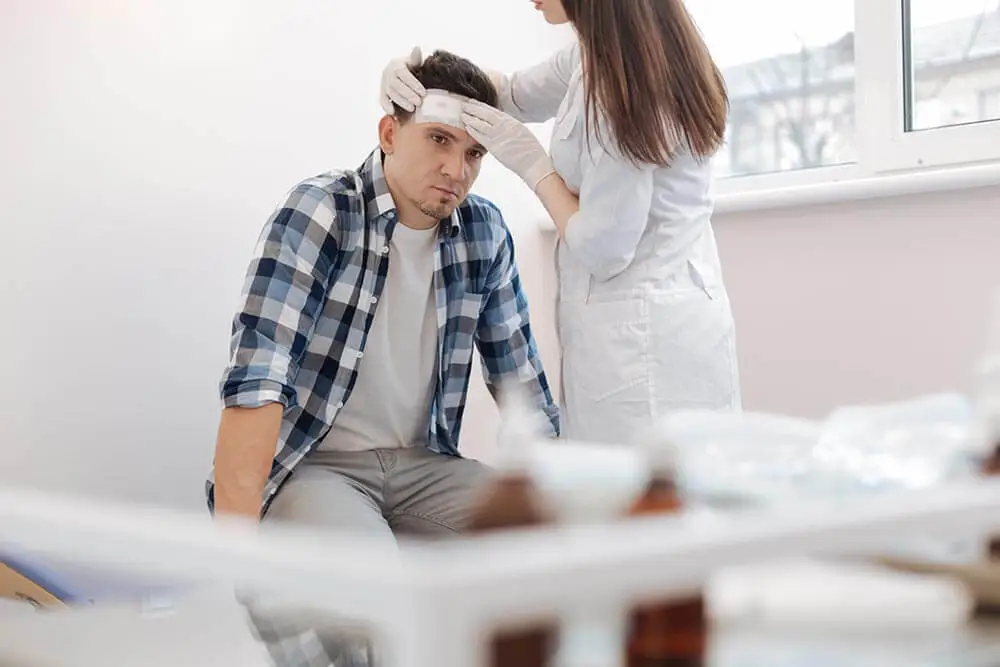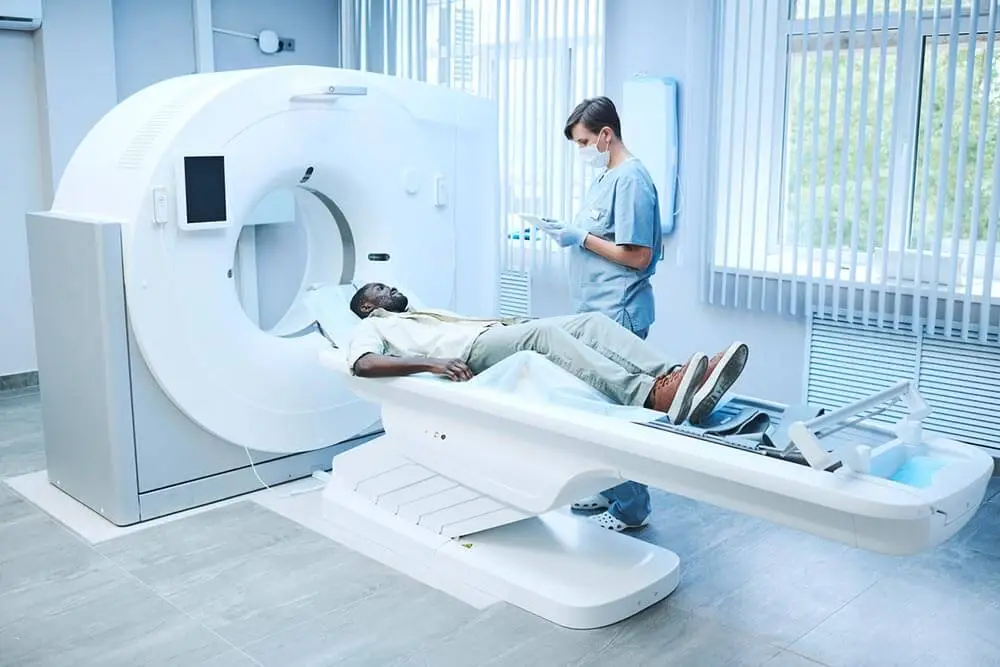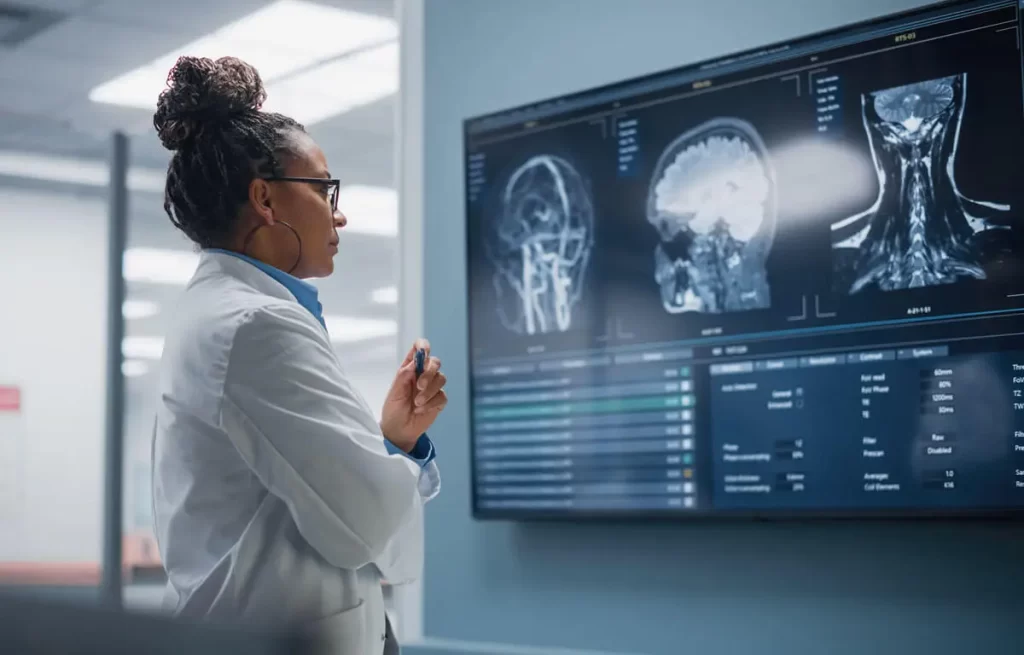How Brain Injury Occurs
Damage to a person’s brain function after birth falls under the category of acquired brain injuries. An acquired brain injury can occur due to various causes, including a traumatic head injury, stroke, or lack of oxygen.
Essentially, a person can suffer brain damage and subsequent physical disability due to physical trauma or disease affecting the brain.
There are many possible causes that can lead to brain damage. However, brain injury onset comes in two primary forms:
- Sudden onset – brain injury caused by a traumatic blow to the head, stroke, brain infection, drug overdose, or lack of oxygen in the brain (e.g. choking, near-drowning, or a severe asthma attack)
- Insidious onset – brain injury caused by a long-term medical issue, such as brain tumour and other neurodegenerative disorders, or a prolonged struggle with addiction (substance and alcohol abuse)
Types of Brain Injuries
Understanding the types of brain injuries is the first step towards supporting individuals on their way to rehabilitation. The primary classification of brain injuries is based on whether the cause is external or internal. Therefore, medical professionals recognise two types of acquired brain injury: traumatic and non-traumatic.
Traumatic Brain Injuries
Traumatic brain injury occurs due to external factors, such as a violent jolt or blows to the individual’s head. Another cause of traumatic brain injury may involve an object (e.g. a bullet or a broken piece of the skull) going through the brain tissue.
Events leading to traumatic brain injury include:
- Falls
- Road traffic accidents
- Sports injuries
- Gunshot wounds
- Assaults
Mild traumatic brain injury can result in temporary brain damage. However, severe trauma might cause long-term disability due to bleeding, bruising, torn tissues, and other complications.

Non-traumatic Brain Injuries
Non-traumatic brain injuries cover all types of brain damage that do not result from external physical trauma to the individual’s head or body. Instead, non-traumatic brain injury is caused by internal factors.
Causes leading to non-traumatic acquired brain injury include:
- Tumour
- Stroke
- Aneurysm
- Metabolic disorders
- Infectious diseases such as meningitis
Furthermore, a lack of oxygen supply to a particular brain area (due to a near-drowning experience or severe asthma attacks) can lead to anoxic brain injury.
What is Acquired Brain Injury (ABI)?
Acquired brain injury (ABI) is an umbrella term for any damage to the brain that isn’t congenital, hereditary, degenerative, or linked to birth trauma. Therefore, an acquired brain injury is defined as a type of brain injury that occurs after the person’s birth.
This type of injury causes changes to the overall brain activity, impacting the brain neurons’ functional ability and metabolic activity.
Evidence suggests that all forms of acquired brain injury result in significant alterations in thinking and behaviour. However, brain injury is a complex condition that uniquely impacts every individual’s life. People affected by ABI can expect different symptoms and outcomes on their journey to recovery.
Considering the brain’s essential role in every area of human functioning, acquired brain injury is likely to affect the person and their whole family drastically. Brain injury may disrupt the individual’s social, professional, and family life. Even milder forms of brain injury, also known as concussions, may cause temporary cognitive issues that decrease the individual’s capacity to perform everyday activities.
The effects of ABI may be disruptive. Proactive adjustments and supportive accommodation of individual preferences are vital for recovery.
Symptoms of ABI
The signs and symptoms of an acquired brain injury vary from subtle to severe. Symptoms may go unnoticed by their loved ones, especially if they seem stable right after the incident. Understanding the early warning signs of ABI is the first step towards ensuring quality care for the individual.
The following symptoms indicate the person’s urgent need for medical attention.
Physical Effects
A person who suffered an acquired brain injury will likely experience various physical symptoms after the incident.
Below are listed the common physical effects of ABI:
- Loss of consciousness that can last from a few minutes to several hours
- Persistent and worsening headache or neck pain
- Seizures or convulsions
- Impairment of sensory abilities (vision, hearing, smell, or taste)
- Pupil dilation in one or both eyes
- Nausea or vomiting
- Cerebrospinal fluid leak (clear fluid coming out of the nose or ears)
- Numbness and weakness in the fingers and toes

Effects on Cognitive and Learning Abilities
ABI can result in long-term changes in the person’s cognitive functioning. Children and young people with traumatic brain injuries may develop specific learning disabilities. These individuals often benefit from professional support to promote their skills and strengths.
Below are listed the effects of ABI on cognitive and learning abilities:
- Memory loss
- Focus and concentration issues
- Impaired planning and organisation skills
- Difficulty keeping up a conversation
- Struggling to carry out everyday activities
- Changes in the person’s academic or professional performance
- Impairment of balance and coordination
- Sleep disturbances
Mental and Behavioural Effects
The effects of acquired brain injury can impact the individual’s behaviour, personality, and mental health. Mental and behavioural effects are sometimes the hardest for others to acknowledge, but additional support and care can increase the quality of life and fulfilment for those with ABI.
Acquired brain injury leads to the following emotional and behavioural issues:
- Growing irritable, short-tempered, and prone to aggression
- Lethargy
- Confusion
- Loss of interest in common activities
- Anxiety
- Depression
Causes of Acquired Brain Injury (ABI)
Acquired brain injury can occur due to a wide range of events after birth. Essentially, acquired brain injury can be caused by an external, violent blow to the head or internal medical issues.
The most common factors that lead to these injuries include:
- Physical trauma to the brain – caused by a head injury from a fall, road accident, sports or work-related incident, violent assault, gunshot wound, or explosion
- Sudden medical events – including vascular accidents (stroke, cardiac arrest, aneurysm), brain tumours, or brain infections (meningitis, encephalitis)
- Neurodegenerative disorders – such as motor neurone disease, multiple sclerosis, Parkinson’s disease, or Huntington’s disease
- Disruption of oxygen supply to the brain (hypoxia – reduced oxygen supply or anoxia – complete lack of oxygen) – caused by near-drowning experiences, choking, suffocation, strangulation, or attempted suicide
- Consumption of toxins – prolonged alcohol or substance abuse
How is ABI Diagnosed?
The medical staff will ask you some useful questions that can help them assess a person’s condition. First, the doctors will ask you to describe how the injury occurred, where the individual was struck, whether they lost consciousness and how long. Furthermore, they will need to know more about the initial symptoms after the incident, such as changes in speech, alertness, coordination, and sensory abilities.
After this initial assessment, the doctors will test the injured person’s thinking, memory, and ability to partake in essential everyday activities. This testing provides further information about the type of brain injury and the specific care services the individual will require in their rehabilitation process. Depending on what caused the brain injury, affected individuals may need to undergo various tests. Most patients with an acquired brain injury require a brain scan.
In the case of a suspected traumatic brain injury, the first test medical experts usually perform in the emergency room is a CT (computerised tomography) scan. CT scans visualise fractures in the brain and provide evidence of internal bleeding, blood clot swelling, and bruised brain tissue. Once the patient’s condition is stabilised, the medical staff may use an MRI (magnetic resonance imaging) for a detailed brain image. In some cases, doctors may use an intracranial pressure monitor to observe possible pressure from tissue swelling in the brain.

Treatment for ABI
For most people with an acquired brain injury. Individuals who have undergone a severe brain injury need to relearn essential life skills, such as speech and movement. The main goal of rehabilitation is to improve the person’s ability to perform everyday activities and regain independence.
Depending on the severity of the incident and the specific area of the brain affected by the injury, the type and duration of the recovery process for different patients may vary.
The rehabilitation care team typically consists of the following specialists:
- Neuropsychologist – responsible for the assessment of changes in cognitive performance, assistance with behavioural management through coping strategies, and providing emotional support during the recovery process
- Acquired brain injury nurse specialist – coordinates care services provided to patients and helps their family members learn more about the injury and rehabilitation
- Physical therapist – helps the patient regain mobility and balance
- Occupational therapist – assists the patient with relearning the skills needed to complete basic everyday activities
- Speech and language therapist – helps the individual regain their language and communication skills by employing effective strategies and assistive devices if necessary
- Social worker – provides access to care service agencies, assists the family with vital decisions about the individual’s support, and refers family members to quality care providers
Rehabilitation after an acquired brain injury takes time, patience and compassionate care. While some patients may improve in the first few months, others may have long-term effects from the head injury. Access to tailored care at home allows individuals with acquired brain injury to live as independently as possible while staying close to their loved ones.
How Unique Community Services Supports People with ABI
At Unique Community Services, delivering high-standard support for individuals with acquired brain injury is our mission. Our trained practitioners provide CQC-regulated care to individuals with complex needs of all ages. We aim to guide people toward independence and ensure their active integration within the local community.
We are aware of the life-changing impact acquired brain injury has on the person and their whole family. Therefore, our compassionate, person-centred team offers you interdisciplinary support in the comfort of your own home. Your privacy, dignity, and personal boundaries are the utmost priority in every decision regarding your treatment.
If you are searching for a quality care service provider for a loved one with an acquired brain injury, Unique Community Services is the right choice for you. We provide tailored at-home care for children and adults with complex needs in Bristol and Manchester.
Contact us, and we will outline a personalised plan that caters to your specific needs.














